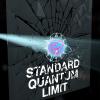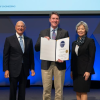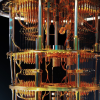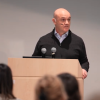Headlines
 The Department of Energy has renewed funding for the Quantum Systems Accelerator, which was established in 2020 to expand the frontiers of quantum computing, communication, sensing and materials.
The Department of Energy has renewed funding for the Quantum Systems Accelerator, which was established in 2020 to expand the frontiers of quantum computing, communication, sensing and materials. The Colorado Quantum Incubator—a CU Boulder-led hub for advancing quantum lab-to-market technology translation—is building a vibrant community with a roster of engaging events and leading industry tenants including newest member, OEwaves.
The Colorado Quantum Incubator—a CU Boulder-led hub for advancing quantum lab-to-market technology translation—is building a vibrant community with a roster of engaging events and leading industry tenants including newest member, OEwaves. Ye’s continued presence on this list reflects not only his scientific excellence but also his leadership in advancing quantum research initiatives, including the CUbit Quantum Initiative and the Q-SEnSE institute, which are shaping the future of quantum technologies.
Ye’s continued presence on this list reflects not only his scientific excellence but also his leadership in advancing quantum research initiatives, including the CUbit Quantum Initiative and the Q-SEnSE institute, which are shaping the future of quantum technologies. A novel partnership between CU Boulder's Colorado Quantum Incubator and Stout Street Capital, a Denver-based venture capital firm and ecosystem builder focused on deep tech, will allow the partners to invest in and incubate startups tackling the complex challenges of next-generation quantum technologies.
A novel partnership between CU Boulder's Colorado Quantum Incubator and Stout Street Capital, a Denver-based venture capital firm and ecosystem builder focused on deep tech, will allow the partners to invest in and incubate startups tackling the complex challenges of next-generation quantum technologies. In a new study, researchers led by JILA and NIST Fellow Jun Ye have shown that it’s possible to go beyond a fundamental barrier in quantum measurements by using a technique called spin squeezing. This work could help improve everything from GPS systems to tests of gravity and the nature of the universe.
In a new study, researchers led by JILA and NIST Fellow Jun Ye have shown that it’s possible to go beyond a fundamental barrier in quantum measurements by using a technique called spin squeezing. This work could help improve everything from GPS systems to tests of gravity and the nature of the universe. A team of physicists and education researchers led by CU Boulder and the Rochester Institute of Technology is spearheading the largest study of its kind exploring how the United States can meet the needs of the rapidly growing quantum technology industry.
A team of physicists and education researchers led by CU Boulder and the Rochester Institute of Technology is spearheading the largest study of its kind exploring how the United States can meet the needs of the rapidly growing quantum technology industry. Professor Diddams (Physics; Electrical, Computer and Energy Engineering) was recognized for his outstanding contributions in optical frequency combs and their applications. He joins 128 new U.S. members and 21 international members to the Class of 2025.
Professor Diddams (Physics; Electrical, Computer and Energy Engineering) was recognized for his outstanding contributions in optical frequency combs and their applications. He joins 128 new U.S. members and 21 international members to the Class of 2025. In a new study funded by AB Nexus—an initiative designed to expand collaborations between the CU Anschutz and Boulder campuses—researchers are working with IQM Quantum Computers to identify chemical compounds that might be effective at treating colorectal cancer and inhibiting resistance to chemotherapy.
In a new study funded by AB Nexus—an initiative designed to expand collaborations between the CU Anschutz and Boulder campuses—researchers are working with IQM Quantum Computers to identify chemical compounds that might be effective at treating colorectal cancer and inhibiting resistance to chemotherapy. At the annual presentation, Senior Vice Chancellor for Research and Innovation and Dean of the Institutes Massimo Ruzzene highlighted key accomplishments over the past fiscal year, including the launch of the Colorado Quantum Incubator, progress on the National Quantum Nanofab facility, and more.
At the annual presentation, Senior Vice Chancellor for Research and Innovation and Dean of the Institutes Massimo Ruzzene highlighted key accomplishments over the past fiscal year, including the launch of the Colorado Quantum Incubator, progress on the National Quantum Nanofab facility, and more. Like many rockstar scientists, 2025 physics Nobel Laureate John Martinis spent time in Boulder’s rich scientific ecosystem mentoring graduate students and inspiring others in quantum computing. In the 1990s, while working as a scientist at NIST, Martinis also held the position of a physics lecturer at CU Boulder.
Like many rockstar scientists, 2025 physics Nobel Laureate John Martinis spent time in Boulder’s rich scientific ecosystem mentoring graduate students and inspiring others in quantum computing. In the 1990s, while working as a scientist at NIST, Martinis also held the position of a physics lecturer at CU Boulder.

